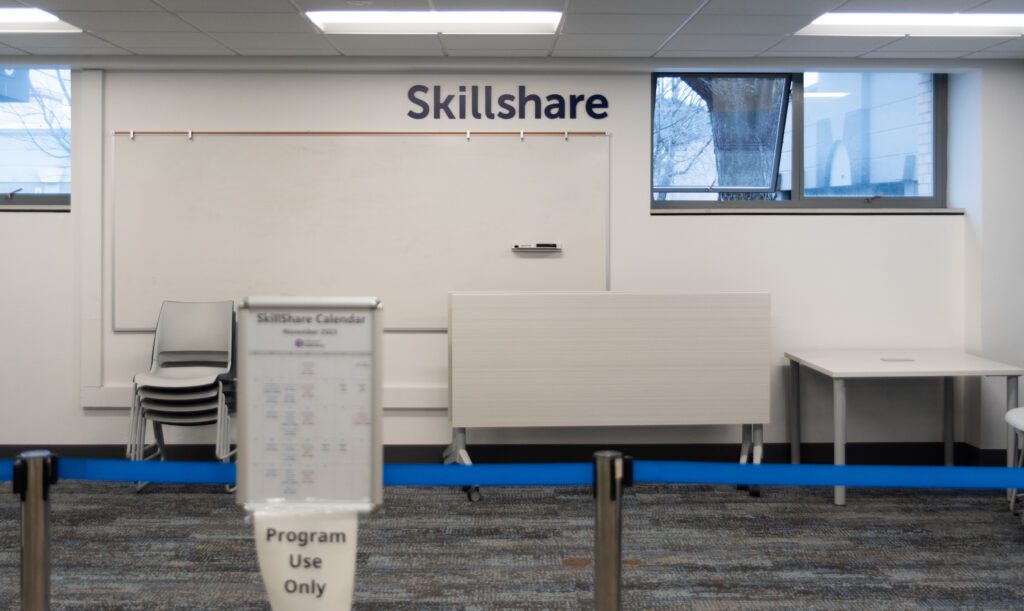Editor’s Note: This story is part of an occasional series covering the impact of homelessness in Whatcom County.
Bring services to where people are.
That’s a theme in some recent actions by local public agencies: meet people who might need behavioral health and other services where they tend to congregate — in public spaces.
It’s the thinking behind a recent effort to bring a behavioral health specialist to the Bellingham Public Library in January.
As one of the few truly public indoor spaces in the city, library usage is high. More than 1,000 people use the facility every day, Bellingham Public Library Director Rebecca Judd said. Since the pandemic, as homelessness, drug use and mental health needs have grown in the broader community, there’s also been an increase in behavioral health-related and substance use-related issues in the library.

The move, recently funded by Bellingham City Council and Whatcom County Council, will contract with the Lake Whatcom Residential & Treatment Center to provide seven-days-a-week help to reduce risks for drug use and provide intervention for declining mental health conditions.
Judd said the increase prompted the need for this program. Library workers are not trained as social workers, she added, and this position will take some of the weight off other staff members.
She said this program has been associated with homelessness, but she hopes it will also help a broader population struggling with mental health concerns.

Starting Jan. 1, 2024, the behavioral health specialist will build relationships, answer questions, connect people to services and offer intervention if people have greater needs, Judd said. It supplements weekly drop-in support by social service agencies in the library.
Malora Christensen, response systems manager at the Whatcom Health Department, said it makes “good sense” to have a specialized person on the library team to “support library patrons who might have some needs that go well beyond what a librarian will do.”
“We want to take the appropriate services to the places where people already are as opposed to, ‘Hey, here’s some support, you have to come here at this time to stand on this line,’” Christensen said. “This really is, in action, meeting people where they’re at.”
Transit agency adds new roles, beefs up training
Beyond the library, the Whatcom Transportation Authority also provides a space for people to sit and warm up during the day. The WTA provides 50,000 six-ride tickets a year to low-income or disabled community members a year through social service agencies to help people get around, Public Information Officer Maureen McCarthy said.
“People who are cool, they can ride the bus and just go from one bus to the next,” said Andrew Butcher, a terminal expeditor at WTA. People are also permitted to sit inside terminals, as long as they follow stated rules.
Butcher is in charge of “maintaining order” at the Bellingham station — meaning he helps direct people to the right buses, but also helps people who need support. He said there’s been an uptick of people in crisis around the stations.
Bringing in “transit safety officers” in July has been part of the solution. While not behavioral health specialists, McCarthy said they’re trained to not only de-escalate situations if people are acting in a threatening way, but also to be “resource providers” and establish relationships with people.
Butcher said the safety officers have been great in terms of mellowing out behavioral issues at the station and on transit, although he emphasized that incidents of violence and drug use on transit are extremely rare. He said the safety officers are “non-confrontational.”
Increasing training has been another aspect of WTA’s approach. All operations supervisors, transit safety officers and expeditors have received Ryan Dowd’s de-escalation training for those who interact with people experiencing homelessness, McCarthy said in an email.
Now, the WTA is developing training in-house to provide transit operators with skills to resolve conflict on a bus. It will be offered to all front-line employees once a year.
Narcan training and the overdose antidote naloxone are also available to transit employees now, after Butcher revived someone at the Cordata Station in January who overdosed in a portable toilet. Butcher and colleague Kevin Goldsberry recently received a 2023 Northwest Washington Red Cross Call to Action Award for their efforts in reviving the person.
The increased support and training reflect a new reality of public agencies pivoting to meet different needs in the community.
Judd said she’s seen a shift in the role of the library. Before, the “free and open space” of a library was a backdrop to library services, but now, it’s swapped. “Maintaining a welcoming and inclusive public space takes a lot of our time and attention and care right now,” she said.
Butcher said transit workers have always been part of the “social fabric,” but now they’re connecting people to food banks, hot meals, shelters and even just talking with people who don’t have people to talk to.
“Anyone who’s facing the public, especially with marginalized people who are experiencing homelessness, we’ve taken on an entirely new role,” Butcher said.
A previous version of this story misstated the name of the Whatcom Transportation Authority. The story was updated to reflect this change at 9:07 a.m. on Wednesday, Dec. 27. Cascadia Daily News regrets this error.




